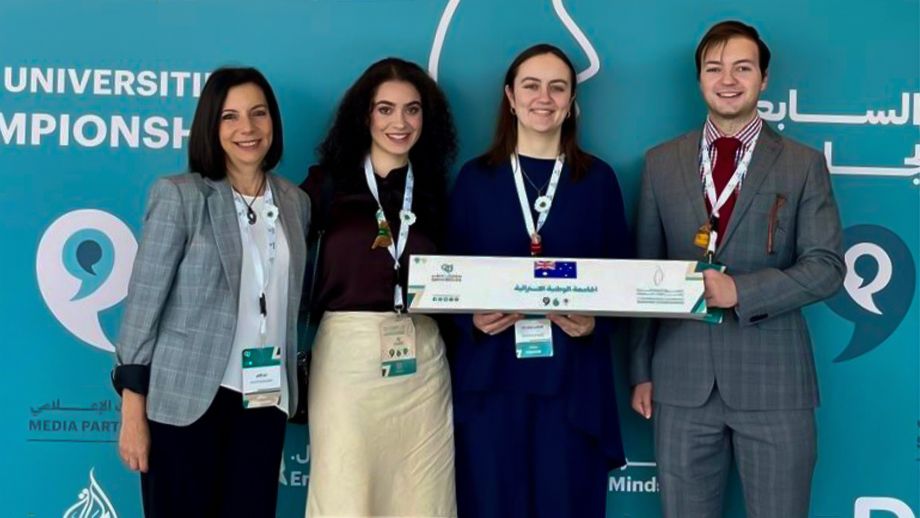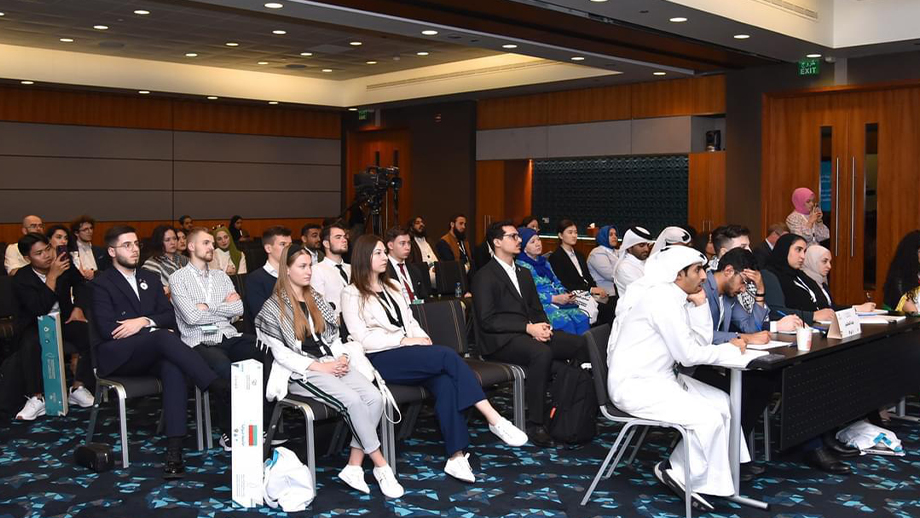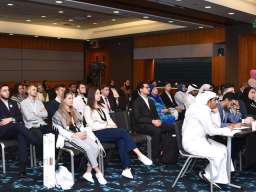ANU Shines at International Arabic Debating Championship

Image supplied. Left to Right: Leila Kouatly, Ruba Nazzal, Clare Taylor, Callum Hogden.
This year the only Australian team to compete for the 7th International Universities Arabic Debating Championship (IUADC) title at the biggest Arabic debate event in the world was attended by The Australian National University (ANU). The team placed fourth in the non-native category and 40th overall. Training weekly for almost a year certainly paid off, as this is the best result ANU has achieved since our inaugural visit in 2013.
More than 600 students from 96 universities around the globe arrived in Doha, Qatar in late May for the five-day competition. Among them, three outstanding students from ANU—Callum Hogden (Bachelor of Arts/Bachelor of Engineering), Ruba Nazzal (Bachelor of Engineering (Honours)), and Clare Taylor (Diploma of Languages) took centre stage. They were accompanied by Leila Kouatly, Lecturer in Arabic Language Pedagogy and Convenor of the Arabic Language Program.
Ruba explains, topics ranged from, “the gig economy, environmental movement, refugees' rights to state-sponsored media. The most difficult topic we had to debate was that we should ban revolutionary leaders and their families from running for political office post-conflict.”
For those wondering how one even attempts to take on such a challenge in their non-native language, Clare shares, “we approached the topic by breaking down the model for our policy and stance required, mapping out the strongest arguments for our points, possible rebuttals, and tried to ensure that we had the right vocabulary for the debate.”
Convenor, Leila, says she was overwhelmed with pride, “at the announcement the team had made it to the semi-finals – something we were least expecting. It made me realise how much their performance and confidence had improved in such a short period of time.” Adding, the students’ critical thinking and argumentation skills, “are a reflection of the world-class education they get at ANU, and this is what gave them the edge over teams that had better language skills.”
 Image caption: Image supplied. Crowd gathered at the International IUADC
Image caption: Image supplied. Crowd gathered at the International IUADC
Clare comments, “When we were practicing between classes, or on evenings and the weekend, Leila was right there with us while also running the Arabic program. I can confidently say that it was only through her hard work, perseverance, and genuine desire to see her students succeed that we were able to get to Doha.”
Clare reflects on the profound cultural exchanges that took place during the championship. “In our second debate, we took on the team from the University of Sarajevo in Bosnia and Herzegovina and became friends over the course of the championship. In talking with them, they offered us small crocheted white and green flowers, and explained that these were symbols of remembrance of the Srebrenica Genocide; they explained that their people were still fighting for proper recognition of the suffering that had occurred and that they wanted this championship to be an opportunity to educate others about what had happened. In the context of everything that’s happening in the world right now, this interaction felt especially meaningful. We wore the flowers throughout the rest of the debates.”
Callum recalls a standout moment from his debating journey, highlighting the camaraderie and support that transcended team rivalries. “One of the more memorable interactions was after our semi-final debate. Many teams we hadn't ever met or interacted with at that point had come to watch our debate and support us and afterwards came and congratulated us on our performance and gave us their well wishes which was really humbling.”
Outside the intensity of the competition, the group relished the opportunity to visit the Qatar National Museum. Ruba comments, “the experience left a lasting impression” Clare continues, “Bin Jelmood House, which covers the history of slavery, especially in Qatar, was eye-opening and offered an interesting insight into a state trying to engage with difficult parts of its own history.” Callum says the team also, “spent a lot of time at Souq Waqif or "the standing market" in Doha. It's a really beautiful traditional Arabic market and it was always bustling with stalls selling food, traditional clothing, gold, jewellery and even birds such as falcons.”
The Australian Ambassador to Qatar, and ANU Alumnus, Mr Shane Flanagan expressed his congratulations on X.
Big congrats to the ANU Arabic debating team for progressing to the semi-finals of the non-native category of #QatarDebate. Special mention to Ruba who received individual recognition for her outstanding Arabic language skills. 👏@ANUcass@caisanupic.twitter.com/LkjaocaIFK
— Shane Flanagan 🇦🇺 (@AusAmbQatar) May 29, 2024
Offering a piece of advice to potential students interested in undertaking such a challenge, Callum says, “the biggest thing would be to read widely in both English and Arabic in order to gain new perspectives on issues. In debating, you don't know which side of a debate you will have to argue ahead of time and so you need to be able to argue from both standpoints even if your position contradicts your own personal beliefs.” Ruba adds, “When I first started debating in Arabic, I doubted that I would be able to confidently deliver a speech for 7 minutes in another language. So my advice is to keep practising no matter what! I made plenty of embarrassing mistakes, delivered some dodgy speeches and some nonsensical sentences, but that's the only way to learn!” Clare advises, “Embrace the challenge, push past the discomfort and see where it takes you. We went into this championship wanting to try our best, have fun, and see Doha, and we ended up making the semi-finals!”
Leaving with a large collection of badges and pins from around the world, Ruba says, “being surrounded by Arabic speakers from a range of backgrounds and fluency levels throughout the competition made me feel like my hard work over the past few years had really paid off since I was able to converse with people from around the world.”
Team ranking:
Semi-finalists in the non-native speaker category, 4th overall in the non-native category, 40th out of 96.
Overall speaker rankings:
Ruba Nazzal: equal 77th out of 286, 5th best overall non-native speaker.
Callum Hogden: 95th out of 286.
Clare Taylor: 117th out of 286, equal 31st out of 145/3rd best non-native for speech of reply.
(96, 286, and 145 includes native and non-native speakers).
